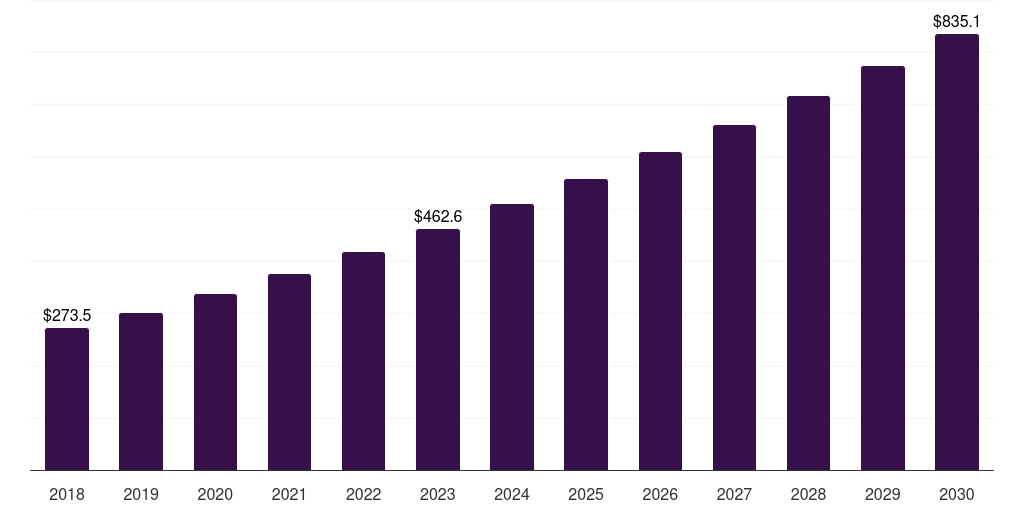U.S. Human Embryonic Stem Cells Market Size & Outlook
U.S. human embryonic stem cells market, 2018-2030 (US$M)

Related Markets
U.S. human embryonic stem cells market highlights
- The U.S. human embryonic stem cells market generated a revenue of USD 462.6 million in 2023 and is expected to reach USD 835.1 million by 2030.
- The U.S. market is expected to grow at a CAGR of 8.8% from 2024 to 2030.
- In terms of segment, regenerative medicine was the largest revenue generating application in 2023.
- Drug Discovery & Development is the most lucrative application segment registering the fastest growth during the forecast period.
Human embryonic stem cells market data book summary
| Market revenue in 2023 | USD 462.6 million |
| Market revenue in 2030 | USD 835.1 million |
| Growth rate | 8.8% (CAGR from 2023 to 2030) |
| Largest segment | Regenerative medicine |
| Fastest growing segment | Drug Discovery & Development |
| Historical data | 2018 - 2022 |
| Base year | 2023 |
| Forecast period | 2024 - 2030 |
| Quantitative units | Revenue in USD million |
| Market segmentation | Regenerative Medicine, Drug Discovery & Development |
| Key market players worldwide | Thermo Fisher Scientific Inc, Sartorius Stedim Biotech SA, Element Solutions Inc, PromoCell GmbH, Lonza Group Ltd, LifeCell International, Gilead Sciences Inc, International Stem Cell Corp |
Other key industry trends
- In terms of revenue, U.S. accounted for 32.4% of the global human embryonic stem cells market in 2023.
- Country-wise, U.S. is expected to lead the global market in terms of revenue in 2030.
- In North America, U.S. human embryonic stem cells market is projected to lead the regional market in terms of revenue in 2030.
- Canada is the fastest growing regional market in North America and is projected to reach USD 300.4 million by 2030.
No credit card required*
Horizon in a snapshot
- 30K+ Global Market Reports
- 120K+ Country Reports
- 1.2M+ Market Statistics
- 200K+ Company Profiles
- Industry insights and more
Human Embryonic Stem Cells Market Scope
Human Embryonic Stem Cells Market Companies
| Name | Profile | # Employees | HQ | Website |
|---|
U.S. human embryonic stem cells market outlook
The databook is designed to serve as a comprehensive guide to navigating this sector. The databook focuses on market statistics denoted in the form of revenue and y-o-y growth and CAGR across the globe and regions. A detailed competitive and opportunity analyses related to human embryonic stem cells market will help companies and investors design strategic landscapes.
Regenerative medicine was the largest segment with a revenue share of 90.42% in 2023. Horizon Databook has segmented the U.S. human embryonic stem cells market based on regenerative medicine, drug discovery & development covering the revenue growth of each sub-segment from 2018 to 2030.
Presence of funding from government organizations significantly contributes to market growth in the U.S. This funding was provided to undertake over 250 projects based on cell lines that were created from leftover embryos from in-vitro fertilization procedures that were donated for research purpose.
However, in May 2017, the NIH has announced to limit the grant money that an individual scientist can receive, thereby making grants available to other aspiring researchers. Stanford Medicine is engaged in the development of stem cell therapies for bone marrow transplant and ophthalmology.
Moreover, cancer immunotherapy experts are engaged in endeavors for the development of cancer treatments that outsmart the current treatments. Further, the National Academy of Sciences had recommended the guidelines for hESC research in 2005 to encourage responsible practices by privately funded projects in human embryonic stem cell research.
Reasons to subscribe to U.S. human embryonic stem cells market databook:
-
Access to comprehensive data: Horizon Databook provides over 1 million market statistics and 20,000+ reports, offering extensive coverage across various industries and regions.
-
Informed decision making: Subscribers gain insights into market trends, customer preferences, and competitor strategies, empowering informed business decisions.
-
Cost-Effective solution: It's recognized as the world's most cost-effective market research database, offering high ROI through its vast repository of data and reports.
-
Customizable reports: Tailored reports and analytics allow companies to drill down into specific markets, demographics, or product segments, adapting to unique business needs.
-
Strategic advantage: By staying updated with the latest market intelligence, companies can stay ahead of competitors, anticipate industry shifts, and capitalize on emerging opportunities.
Target buyers of U.S. human embryonic stem cells market databook
-
Our clientele includes a mix of human embryonic stem cells market companies, investment firms, advisory firms & academic institutions.
-
30% of our revenue is generated working with investment firms and helping them identify viable opportunity areas.
-
Approximately 65% of our revenue is generated working with competitive intelligence & market intelligence teams of market participants (manufacturers, service providers, etc.).
-
The rest of the revenue is generated working with academic and research not-for-profit institutes. We do our bit of pro-bono by working with these institutions at subsidized rates.
Horizon Databook provides a detailed overview of country-level data and insights on the U.S. human embryonic stem cells market , including forecasts for subscribers. This country databook contains high-level insights into U.S. human embryonic stem cells market from 2018 to 2030, including revenue numbers, major trends, and company profiles.
Partial client list
U.S. human embryonic stem cells market size, by application, 2018-2030 (US$M)
U.S. Human Embryonic Stem Cells Market Outlook Share, 2023 & 2030 (US$M)
Related regional statistics
Sign up - it's easy, and free!
Sign up and get instant basic access to databook, upgrade
when ready, or enjoy our
free plan indefinitely.
Included in Horizon account
- 30K+ Global Market Reports
- 120K+ Country Reports
- 1.2M+ Market Statistics
- 200K+ Company Profiles
- Industry insights and more



